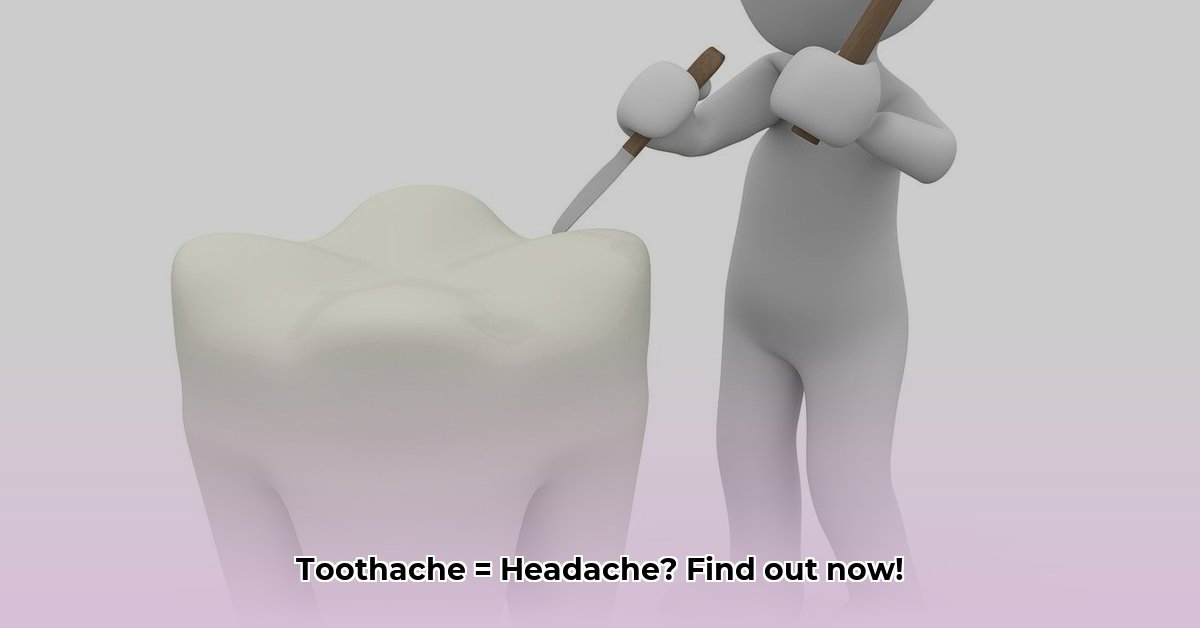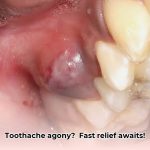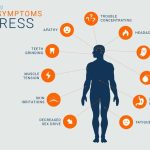Yes, a toothache can cause a headache. The two often occur together due to shared nerve pathways, muscle tension, and related conditions. This article explores the connection, offers practical tips for relief, and advises when to seek professional help.
Understanding the Toothache-Headache Connection
The trigeminal nerve, a major nerve responsible for sensation in the face, plays a key role in linking toothaches and headaches. Branches of this nerve extend to the teeth, jaw, and various parts of the head. When a toothache occurs, pain signals travel along the trigeminal nerve. The brain can sometimes misinterpret the origin of these signals, perceiving the pain as coming from the head—a phenomenon known as referred pain.
The Trigeminal Nerve: Your Body’s Pain Messenger
Imagine the trigeminal nerve as a complex highway system, with branches leading to different areas of your face and head. When a tooth is damaged or infected, pain signals travel along these branches. Sometimes, the brain gets these signals “crossed,” leading to referred pain—you feel the pain in your head, even though it originates in your tooth.
(Image of trigeminal nerve, ideally interactive)
Dental Problems: Common Culprits
Several dental issues can trigger both toothaches and headaches:
- Cavities: Untreated cavities can irritate the tooth’s pulp, causing pain that can radiate to the head.
- Gum Disease (Periodontitis): Inflammation and infection in the gums can also activate pain signals along the trigeminal nerve.
- Abscessed Tooth: This serious infection at the tooth’s root often causes severe pain that spreads to the head.
- Impacted Wisdom Teeth: These can press on surrounding nerves, contributing to both tooth and head pain.
- Bruxism (Teeth Grinding): This can strain the jaw muscles and the temporomandibular joint (TMJ – the hinge connecting your jaw to your skull), leading to tension headaches or even migraines. TMD, or temporomandibular disorder, is a general term for TMJ problems.
Beyond the Tooth: Other Potential Causes
Sometimes, what appears to be a toothache-related headache might stem from other sources:
- Sinus Infections: Given their proximity to the upper teeth, sinus infections can mimic toothaches and trigger sinus headaches.
- TMJ Disorders: Problems with the TMJ itself, like arthritis or injury, are frequently linked to headaches.
- Trigeminal Neuralgia: This nerve disorder causes sharp, shooting pains in the face, which may be mistaken for toothaches and are sometimes accompanied by headaches.
Managing Pain and Seeking Help
While professional care is crucial for treating the underlying cause, several strategies can provide temporary relief:
Home Care Tips:
- Salt Water Rinse: Rinsing with warm salt water can help cleanse the area and reduce inflammation.
- Cold Compress: Applying a cold pack to the cheek can numb the area and reduce swelling.
- Over-the-Counter Pain Relievers: Ibuprofen or acetaminophen can help manage both toothache and headache pain. Follow package instructions carefully.
- Clove Oil (Use with Caution): Diluted clove oil, applied sparingly with a cotton swab, can offer temporary pain relief due to its natural anesthetic properties. Undiluted clove oil can irritate gums.
When to Seek Professional Help:
It’s crucial to consult a dentist or doctor if:
- The pain is severe or persistent.
- You experience swelling, fever, or difficulty opening your mouth.
- You have changes in vision.
- Home care strategies don’t provide relief.
- The pain wakes you up at night.
- An adult tooth becomes loose.
- You experience persistent bleeding from the gums.
- You notice pus or a foul taste in your mouth.
Finding Lasting Relief: Addressing the Root Cause
Treating the underlying dental problem is essential for long-term relief. A dentist can diagnose the issue and recommend appropriate treatment, whether it’s a filling, root canal, treatment for gum disease, or management of bruxism.
Recognizing the Warning Signs
| Condition | Symptoms | When to Seek Help |
|---|---|---|
| Cavity | Sensitivity, pain, visible hole, possibly headache | Promptly |
| Abscessed Tooth | Severe throbbing pain, swelling, fever, possibly headache | Immediately |
| Gum Disease | Red, swollen, bleeding gums, possibly headache | Promptly |
| Impacted Wisdom Teeth | Pain, swelling, difficulty opening mouth, possibly headache | Promptly |
| Bruxism | Jaw pain, headaches, worn teeth | Promptly |
| TMJ Disorder | Jaw pain, clicking/popping jaw, headaches, limited jaw movement | Promptly |
| Sinus Infection | Facial pressure, nasal congestion, headache, possibly tooth pain | If symptoms persist for >7 days |
| Trigeminal Neuralgia | Sharp, shooting facial pain, possibly headache | Promptly |
Frequently Asked Questions (FAQ)
- Can a tooth infection cause a headache? Yes, a tooth infection can cause a headache due to the inflammation and irritation of the trigeminal nerve.
- Can wisdom teeth cause headaches? Yes, impacted wisdom teeth can cause headaches by putting pressure on surrounding nerves.
- Can grinding my teeth cause headaches? Yes, teeth grinding (bruxism) can strain jaw muscles and the TMJ, leading to tension headaches and migraines.
- How can I tell if my headache is from a toothache? The pain may be throbbing and radiate from the affected tooth to the temple or forehead. You might also have jaw tenderness or facial pain.
- What kind of headaches can toothaches cause? Toothaches are often associated with tension headaches, but they can sometimes trigger migraines.
While current research strongly suggests a link between toothaches and headaches, further studies may reveal even more about this complex relationship. It’s important to maintain good oral hygiene to prevent toothaches and their associated headaches. Regular brushing, flossing, and dental check-ups are crucial. If you experience persistent or worsening toothaches and headaches, don’t hesitate to consult a dentist or doctor for a proper diagnosis and treatment plan.
- Worklifebalance Lifecare Provides Key Assistance for Personal Well-being - January 9, 2026
- Work-Life Balance Lifecare Sign In For FedEx Employees - January 8, 2026
- How Work Life Balance Coaching Consultants Boost Well-Being - January 7, 2026
















